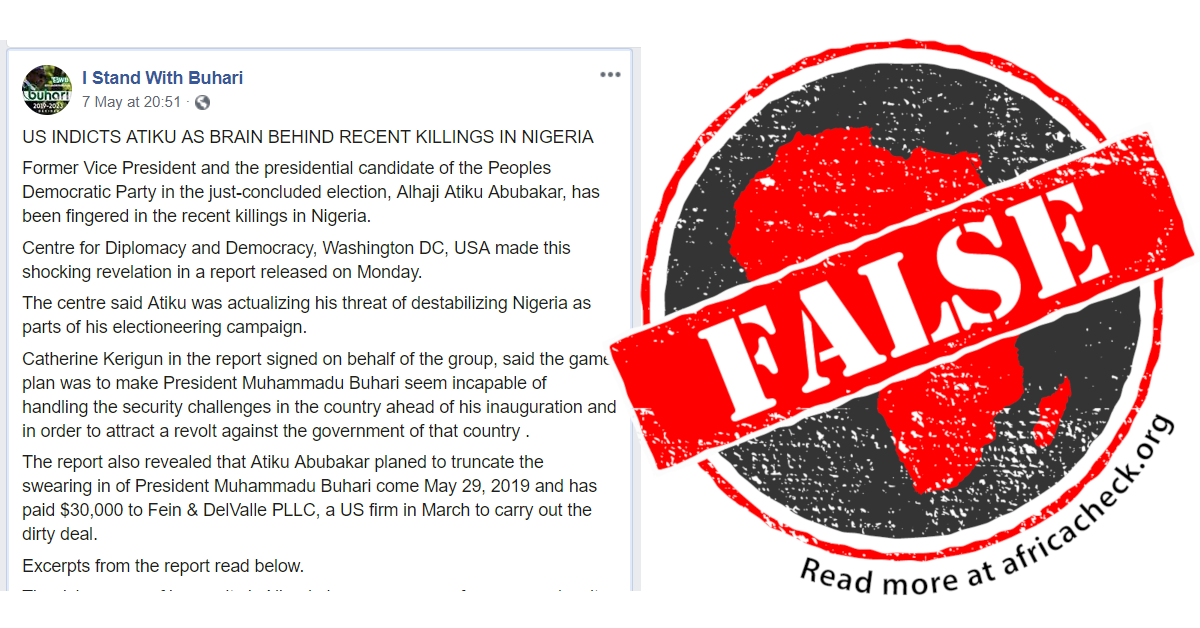Reports of killings and kidnappings across Nigeria after the February and March 2019 elections have put people on edge.
Then in May news articles surfaced claiming a US report had identified unsuccessful presidential candidate Atiku Abubakar as the “mastermind” behind the spate of murders.
Abubakar, widely known by his first name, Atiku, was the opposition Peoples Democratic Party’s candidate. He is in court challenging the outcome of the polls.
The claim appeared in a number of less-known online news outlets. It was not published by any well-known national newspaper.
It has been shared several times on social media, including on a Facebook page – I Stand with Buhari – that supports the president. The post has been shared more than 200 times.
The articles claim an organisation called the Centre for Diplomacy and Democracy, based in Washington DC, released a report on 6 May 2019 stating that Atiku was “actualising his threat of destabilising Nigeria as parts of his electioneering campaign”.
The report was supposedly signed by one Catherine Kerigun on behalf of the centre.
It was not attributed to the US government or any of its agencies.

We scoured the internet using multiple search engines as well as directories of charities and non-profit organisations in the US for the “Centre for Diplomacy and Democracy”. It could not be found.
And the centre’s “Catherine Kerigun” doesn’t appear anywhere on Google or social media platforms, including Facebook and Linkedin.
A number of profiles for Catherine Kerrigan were found on Linkedin, and a few on Facebook. But none was associated with an organisation called the Centre for Diplomacy and Democracy.
More than this, the organisation’s report accusing Abubakar can’t be found on the internet. We used sections of text the little-known news sites quoted from the “report” to search for it on Google, but all that came up was the sites themselves.
In a press statement, Abubakar’s campaign described the report as false news “fabricated by Buhari’s administration” - a claim it did not substantiate. – Allwell Okpi (21/05/19)
Then in May news articles surfaced claiming a US report had identified unsuccessful presidential candidate Atiku Abubakar as the “mastermind” behind the spate of murders.
Abubakar, widely known by his first name, Atiku, was the opposition Peoples Democratic Party’s candidate. He is in court challenging the outcome of the polls.
‘Destabilising Nigeria’
The claim appeared in a number of less-known online news outlets. It was not published by any well-known national newspaper.
It has been shared several times on social media, including on a Facebook page – I Stand with Buhari – that supports the president. The post has been shared more than 200 times.
The articles claim an organisation called the Centre for Diplomacy and Democracy, based in Washington DC, released a report on 6 May 2019 stating that Atiku was “actualising his threat of destabilising Nigeria as parts of his electioneering campaign”.
The report was supposedly signed by one Catherine Kerigun on behalf of the centre.
It was not attributed to the US government or any of its agencies.

Diplomacy centre and ‘Catherine Kerigun’ can’t be found
We scoured the internet using multiple search engines as well as directories of charities and non-profit organisations in the US for the “Centre for Diplomacy and Democracy”. It could not be found.
And the centre’s “Catherine Kerigun” doesn’t appear anywhere on Google or social media platforms, including Facebook and Linkedin.
A number of profiles for Catherine Kerrigan were found on Linkedin, and a few on Facebook. But none was associated with an organisation called the Centre for Diplomacy and Democracy.
More than this, the organisation’s report accusing Abubakar can’t be found on the internet. We used sections of text the little-known news sites quoted from the “report” to search for it on Google, but all that came up was the sites themselves.
In a press statement, Abubakar’s campaign described the report as false news “fabricated by Buhari’s administration” - a claim it did not substantiate. – Allwell Okpi (21/05/19)
Republish our content for free
For publishers: what to do if your post is rated false
A fact-checker has rated your Facebook or Instagram post as “false”, “altered”, “partly false” or “missing context”. This could have serious consequences. What do you do?
Click on our guide for the steps you should follow.
Publishers guideAfrica Check teams up with Facebook
Africa Check is a partner in Meta's third-party fact-checking programme to help stop the spread of false information on social media.
The content we rate as “false” will be downgraded on Facebook and Instagram. This means fewer people will see it.
You can also help identify false information on Facebook. This guide explains how.





Add new comment